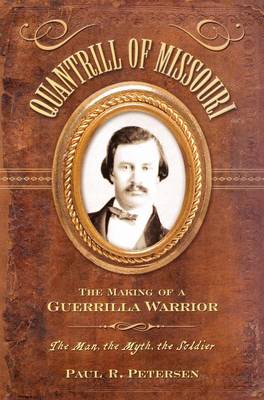
Door een staking bij bpost kan je online bestelling op dit moment iets langer onderweg zijn dan voorzien. Dringend iets nodig? Onze winkels ontvangen jou met open armen!
- Afhalen na 1 uur in een winkel met voorraad
- Gratis thuislevering in België vanaf € 30
- Ruim aanbod met 7 miljoen producten
Door een staking bij bpost kan je online bestelling op dit moment iets langer onderweg zijn dan voorzien. Dringend iets nodig? Onze winkels ontvangen jou met open armen!
- Afhalen na 1 uur in een winkel met voorraad
- Gratis thuislevering in België vanaf € 30
- Ruim aanbod met 7 miljoen producten
Zoeken
€ 51,45
+ 102 punten
Omschrijving
One will not find the name of William Clarke Quantrill in the pantheon of noble Civil War personalities but rather listed near the top of the list of its notorious scoundrels. He has been demonized as the devil incarnate, and most historical accounts portray him as a sadistic, pitiless, bloodthirsty killer. That image, however, did not ring true to Paul R. Petersen when he weighed it against the man's wartime accomplishments. When he began researching Quantrill of Missouri, he found that much of the lore that has been accepted as fact had been recorded by those who fought against Quantrill. In short, the victors wrote the history. Petersen asks, "How could this so-called fiend have been a respected schoolteacher? How could he have organized and led up to four hundred men in the most noted band of guerrilla fighters known to history? How could he be so hated by his own men and still lead them in the most renowned battles through Missouri, winning victories over superior Union forces? Others entrusted their sons to him. Others served him as spies. Women willingly tended his wounded, and his followers even guarded him in battle. Most of his people were God-fearing farmers...God-fearing, righteous people would not have followed a depraved, degenerate, psychotic killer."
Specificaties
Betrokkenen
- Auteur(s):
- Uitgeverij:
Inhoud
- Aantal bladzijden:
- 504
- Taal:
- Engels
Eigenschappen
- Productcode (EAN):
- 9781581823592
- Verschijningsdatum:
- 1/09/2003
- Uitvoering:
- Hardcover
- Formaat:
- Genaaid
- Afmetingen:
- 175 mm x 246 mm
- Gewicht:
- 1043 g

Alleen bij Standaard Boekhandel
+ 102 punten op je klantenkaart van Standaard Boekhandel
Beoordelingen
We publiceren alleen reviews die voldoen aan de voorwaarden voor reviews. Bekijk onze voorwaarden voor reviews.











